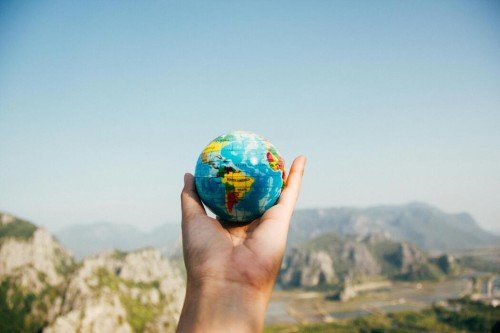Will the Future Earth Still Be Our Home

With each passing year, humanity’s influence on the planet grows more evident, in our air, our oceans, our forests, and even the climate that sustains life. As scientists, policymakers, and citizens grapple with the accelerating pace of change, one truth stands out: the future of Earth depends entirely on what we choose to do today.
A Planet Under Pressure
For billions of years, Earth has evolved through cycles of change, ice ages, warm periods, mass extinctions, and rebirths. But the transformation unfolding now is unlike anything in its history. Driven by human activity, this era of change is rapid, global, and largely irreversible.
Our planet’s temperature has already risen by more than 1.2°C since the late 19th century, and the effects are everywhere. Glaciers that stood firm for centuries are melting. Oceans are warming and expanding, swallowing coastlines that once seemed unshakable. Forests burn with unprecedented intensity, while regions that once bloomed with life now face droughts and desertification.
The future Earth we are shaping will not be defined by natural cycles alone, it will be defined by us.
The Invisible Threads of Change
Climate change is more than a shift in weather patterns; it is a rewriting of the planet’s systems. Every degree of warming triggers a cascade of consequences. Melting ice sheets release freshwater into the oceans, altering currents that regulate global weather. Rising temperatures increase the frequency of storms and floods, destroying habitats and displacing millions.
But the story doesn’t end with physical change. The effects ripple through economies, politics, and culture. Agriculture faces uncertainty as fertile lands become barren or flooded. Water scarcity fuels migration and conflict. Entire species vanish, and with them, the balance of ecosystems collapses. We are witnessing not just environmental decline, but a transformation of life’s foundation.
Technology and Hope in the Age of Uncertainty
Yet, amid the chaos, there are reasons to hope. Technology, innovation, and global awareness are reshaping how humanity responds to the crisis. Clean energy adoption has accelerated faster than predicted. Solar and wind power now supply more affordable energy to millions worldwide. Nations are experimenting with carbon capture, reforestation, and circular economies. Electric vehicles are becoming the norm rather than the exception, and even large corporations are setting targets for carbon neutrality.
Artificial intelligence and data-driven research are helping scientists predict climate patterns and plan solutions with unprecedented accuracy. In a globalized world, collaboration has become a necessity, not a choice. From legal frameworks protecting natural reserves to translation services enabling international cooperation, small details often make big changes possible. For instance, French legal translation services play a subtle yet crucial role when environmental treaties or sustainability policies need to be understood across linguistic boundaries. Every document shared, every agreement signed, and every law enforced can contribute to a shared planetary future.
The Human Factor: Our Choices Matter
Despite technological progress, the core challenge remains deeply human. Climate change is not just a scientific issue, it’s an emotional, ethical, and social one. The decisions of individuals, communities, and nations determine whether the future Earth will still feel like home. Every action, no matter how small, contributes to the outcome. When we choose renewable energy, reduce waste, or support green initiatives, we are voting for a livable future. When businesses prioritize sustainability, they demonstrate that profit and planet can coexist. But awareness alone is not enough. Real change requires courage, the courage to rethink lifestyles, to challenge outdated systems, and to hold institutions accountable. Humanity must learn to cooperate across borders, beliefs, and languages. The future Earth demands unity of purpose.
Nature’s Resilience and Our Responsibility
Despite the damage done, nature still offers a path to renewal. Forests regenerate when protected. Oceans heal when pollution stops. Wildlife returns when given space. The resilience of Earth is extraordinary, but it has limits.
In 2025 and beyond, restoration must become a defining principle of human civilization. Rewilding, sustainable urban planning, and responsible resource management are not luxuries; they are necessities for survival. The future depends not only on reducing harm but on actively repairing what has been broken. This vision calls for education and communication, bridging the gap between nations, sciences, and cultures. Global understanding, much like the careful precision found in french legal translation services, ensures that meaning is not lost between languages or intentions. When the world speaks with one voice, solutions become clearer, and actions become unified.
Envisioning the Future Earth
Imagine the world in 2050. Cities thrive on clean energy, and forests expand instead of shrinking. Rivers once polluted now flow clear. People live in balance with technology and the environment. Education systems teach not only math and science but also empathy for the planet. This future is not an impossible dream, it is a choice. It requires collective effort, informed leadership, and a shared sense of responsibility. Humanity must recognize that the Earth is not merely a resource; it is our only home.
We must see ourselves as part of a living system, not rulers over it, but caretakers within it. When humans act with awareness and humility, the planet responds with abundance.
The Answer Lies Within Us
So, will the future Earth still be our home? The answer depends entirely on what we do today. Every ton of carbon we prevent, every tree we plant, every policy we enforce, and every child we educate brings us one step closer to preserving that home. The story of Earth is still being written and our generation holds the pen. Whether it becomes a story of loss or renewal is up to us. The choice is clear, and the time is now.